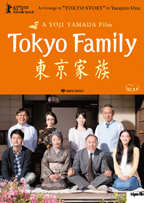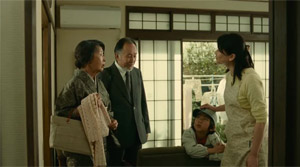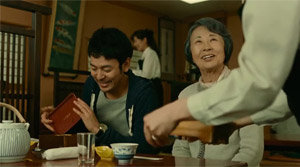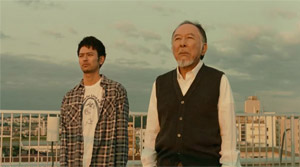

Tokyo Kazoku
Japan 2013
Genre:
Drama
Director:
Yoji Yamada
Cast:
Isao Hashizume
Kazuko Yoshiyuki
Satoshi Tsumabuki
Yu Aoi
Masahiko Nishimura
Yui Natsukawa
Tomoko Nakajima
Shozo Hayashiya
Nenji Kobayashi
Jun Fubuki
Ryuichiro Shibata
Ayumu Maruyama
Chika Arakawa

Tokyo Family
Story: Shukichi (Isao Hashizume) and Tomiko (Kazuko Yoshiyuki) visit their children in Tokyo. Koichi (Masahiko Nishimura) is a physician. He and
his wife Fumiko (Yui Natsukawa) are accommodating them first. After that the daugther, Shigeko (Tomoko Nakajima), takes care of their parents. However,
she has a lot to deal with because of her hairdresser's shop so that she relocates them to a hotel. Actually, the children wanted to show their parents a
bit of Tokyo, but none of them finds the time. The task is eventually left to be dealt with by Shuji (Satoshi Tsumabuki), who as a stage designer is making his
own path in life and because of that shares a complicated relationship with his father Shukichi. Shukichi wants his son to think about his future, but
Shuji lives in the here and now. After the parents have more or less seen everything in Tokyo Shukichi wants to visit an old friend and then return home to
the countryside with his wife. In the meantime Tomiko is visiting Shuji again who introduces her to his girlfriend Noriko (Yu Aoi). Tomiko is
instantly thrilled when meeting her, but Shuji doesn't know how to tell his father about her.
Review: It is without a doubt difficult to bring a remake of a highly praised masterpiece to the big screen. But when Yoji Yamada decides
to adapt "Tokyo Story" from 1953 by Yasujiro Ozu you can breathe a sigh of relief. First of, it needs to be noted that I didn't see the original piece of
work yet. Yet, there are still a few scenes making you realize that Yamada has apparently sticked close to the original. But of course the movie also underwent
a rejuvenation, which is particularly reflected by the high-rise buildings and the bullet train. In any case, Yamada manages to bring to screen a subtle drama
about families and the tiring bonds that go hand in hand with them while also contrasting two generations, a contrast which becomes apparent in social
change. Doing so the director bestows a pleasant amount of wisdom upon his pictures.

That this is a remake or tribute is pretty obvious right from the start. The conversations and the rhythm of the film don't seem modern and at times
the actors/actresses deliver a rather contrived performance. What probably was intended seems barely necessary since a remake is surely allowed to take the
liberty to deviate from the original and shouldn't stick too close to it. There are also a few scenes where the camera work irritates, leading to the individuals
almost looking right into the camera when talking to their partner - another bow to the original. The accordingly somwhat awkward acting thus counts among
the film's disturbing factors as does the running time of almost 150 minutes which can be considered pretty bold. At least the drama doesn't feel nearly
as lengthy as you could think.

Also reminding you of the 50s is the slightly wired, cheerful atmosphere at the beginning. However, not everything is perfect in the family. To get to know
the characters is consequently the movie's driving force, even though it has to be criticized that some of the family members are pretty roughly sketched and
resemble caricatures. Being the black sheep in the family Shuji seems to be the most interesting individual and his relationship with his father is
complicated, probably because things somehow got stuck between them. Therefore, there are certainly captivating family constellations to be found in "Tokyo
Family". It's just that, especially at the beginning, you start to wonder what the movie actually wants to convey. We dive into the everyday life of a family
and watch your usual problems unfold. Only later on the picture becomes sharper and more profound than you could make out at first.
Delivering convincing performances are Isao Hashizume as the (grand)father and Kazuko Yoshiyuki ("Departures") as his
warmhearted, self-sacrificing wife. Satoshi Tsumabuki ("For Loves Sake") has his share of good moments, but it is particularly
Yu Aoi ("Rurouni Kenshin") who manages to stand her ground next to the veteran actors and is also resposible for a pretty
emotional scene. The rest of the cast can never really create the amount of necessary depth, though. However, to keep the audience hooked it certainly isn't
enough to show that the very pragmatic tone constantly breaking through belies the seemingly amiable way everyone deals with one another, leading to the old
couple not being welcome by their kids so that they are sent to a hotel. We still wait for some kind of dramatic moment.

After 100 minutes the drama finally works its way into the foreground. But the movie never becomes melodramatic. Reason for that is the almost coldhearted pragmatic way of the family members of dealing with the drama as is the fact that Yamada never loses control over what's happening on screen. Yoji Yamada ("The Twilight Samurai") is making movies for over fifty years now and looking at the pictures and the way certain topics are tackled you can see the kind of wisdom that you can only obtain through age and experience. Thus, he manages to prevent the ending from diverting into the melodramatic, despite a well-achieved emotional score by Joe Hisaishi. Because of the half-baked characters and its overlength "Tokyo Story" may not count among Yamada's best works, but the movie still succeeds in casting its magic on the audience. Moreover, you actually want to watch the original and maybe that's exactly what Yamada wished to achieve with all his heart.

Disclaimer

















